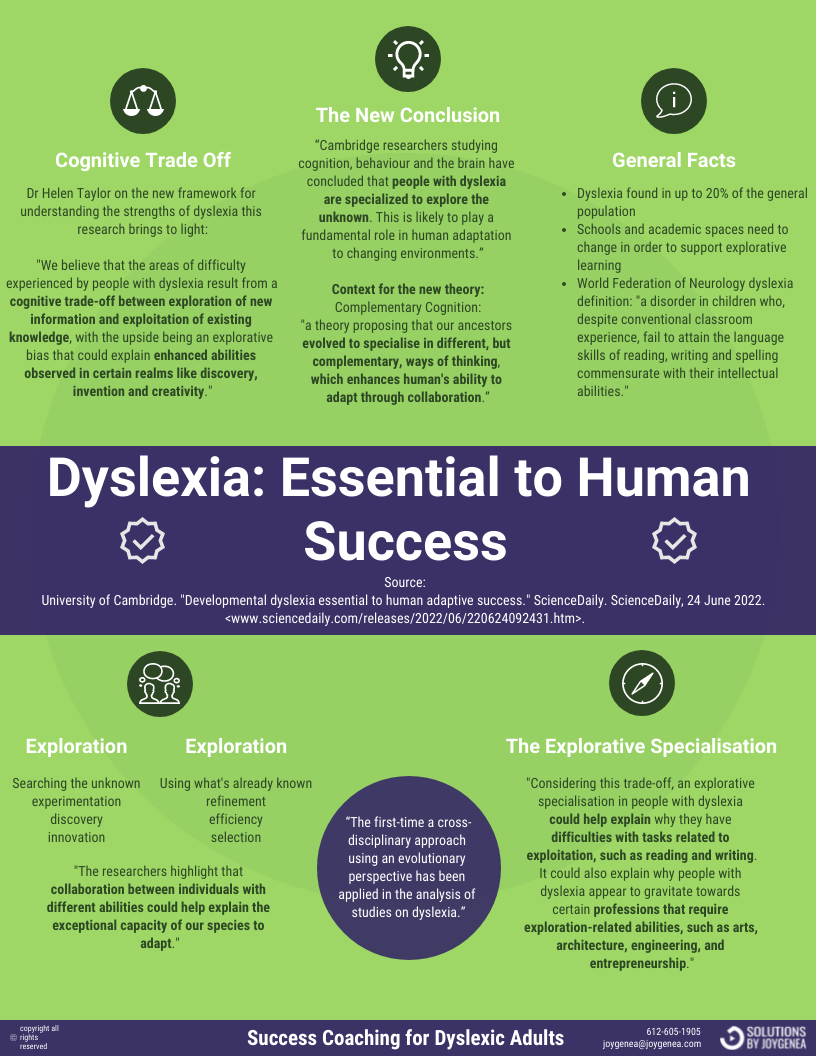“We urgently need to start nurturing explorative thinking of new knowledge to allow humanity to continue to adapt and solve key challenges” ~Helen Taylor
Developmental dyslexia is essential to human adaptive success.
I found this research article today “Developmental dyslexia essential to human adaptive success”
Thank you, Cambridge, for doing this research and releasing this study. As a coach in the neurodiversity sphere, I am always telling people this. While much of the educational system sees us as defective the business and inventor sectors of the world see us as gifted and an important part of forward momentum.
CLICK HERE for a printable PDF version of my infographic
Dyslexia-Essential-to-Human-Success.pdf
Here are some additional thoughts I had while I was reading the report.
“Cambridge researchers studying cognition, behavior and the brain have concluded that people with dyslexia are specialized to explore the unknown. This is likely to play a fundamental role in human adaptation to changing environments.”
How cool is that we were designed to explore the unknown. It really only makes sense and has for years. When you assemble the list of people who are famous in science and the arts the ratio is staggering high compared to the general population. There are key areas where we make fundamental contributions.
How do we take this information and start to shift the narratives in the educational and higher ed systems?
Here is a new word I plan to use often in my presentations in the future ‘explorative bias’.
What this means is that as a dyslexic we have a bias towards exploration. I see this play out over and over again with my clients. They are brave courageous explorers who were told as kids that they were defective and might never make it in the world. Maybe we can start to say things like this, “You have the strength of explorer bias and that makes you a leader in your class.”
They believe that the exploration bias, the cognitive trade-off between exploration and new information and exploration of existing knowledge. That bias could explain enhanced abilities in realms like discovery, invention and creativity.
I think it is so great that someone is trying to better define why dyslexics have higher representation in the entrepreneurial world and some other areas. Bringing a little more credibility and understanding to the outcomes of being an adult with dyslexia affords us new opportunities.
“But we urgently need to start nurturing this way of thinking to allow humanity to continue to adapt and solve key challenges,” said Taylor.
I love this sentence and it needs some ideas behind it. What are some options for schools, academic institutes and workplaces to start building and growing this explorative bias?
I’ll toss out a couple to get us started
- nature preschools
- the Montessori approach
- leaders that invest in exploratory employees
- managers that seek to add exploratory biased staff
The World Federation of Neurology defines dyslexia as “a disorder in children who, despite conventional classroom experience, fail to attain the language skills of reading, writing and spelling commensurate with their intellectual abilities.”
This definition points out the difference between skills and abilities. I like that clarity.
“The new findings are explained in the context of ‘Complementary Cognition’, a theory proposing that our ancestors evolved to specialize in different, but complementary, ways of thinking, which enhances human’s ability to adapt through collaboration.”
Why does this seem shocking to people? To me it just seems obvious.
The article then goes on to talk about the need for people who explore for new resources and those that explore existing resources.
“These cognitive specializations are rooted in a well-known trade-off between exploration of new information and exploitation of existing knowledge…As in any complex system, we must ensure we balance our need to exploit known resources and explore new resources to survive…Exploration encompasses activities that involve searching the unknown such as experimentation, discovery and innovation. In contrast, exploitation is concerned with using what’s already known including refinement, efficiency and selection.”
“Exploration encompasses activities that involve searching the unknown such as experimentation, discovery and innovation…”
Isn’t this a great point? As I read it, I am thinking about how much that explains part of why I don’t fit into some organizations, boards and jobs. And why I struggled in the school system and in systems designed heavily around exploitation. I think it is important to note that we need to stop making one group right and another group wrong. This article highlights the value of a more balanced system.
“The researchers highlight that collaboration between individuals with different abilities could help explain the exceptional capacity of our species to adapt.”
The best semi-recent example I can think of is the creation of the United States and the Declaration of Independence. It took a group of both types of people’s minds to create that document and produce the outcome at the time. A really common example recently is the speed by which new businesses are created and how often they are disruptive to an existing industry. The average life expectancy of a business is shrinking down to under five years. That is down from 20+ just forty years ago.
In summary I think this article starts to highlight the importance of integration of learning styles for the survival of our species.
What comes to mind for you from these highlights of these findings?
Keep thinking outside the box, exploring, and learning to work with the exploitation minds in your sphere.
Thank you,
JoyGenea Schumer
Business Owner, International Neurodiversity Coach and Speaker
